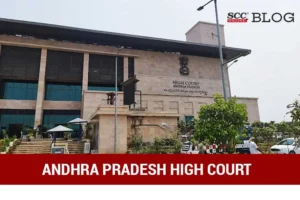Andhra Pradesh High Court: In a case wherein interlocutory applications were filed to direct the respondents to not proceed with the construction of houses for the Economically Weaker Sections (‘EWS') in R5 zone of the Amaravati, the 3-judges bench of D.V.S.S. Somayajulu, Cheekati Manavendranath Roy and Ravi Nath Tilhari, JJ., opined that the larger public interest was against the construction of the houses and thus, this Court passed an interim order to stay the construction of the houses in Amaravati R-5 Zone.
Background
In the instant case, the Government of Andhra Pradesh issued a Government Order (‘GO') dated 31-03-2023 wherein, the Commissioner Capital Region Development Authority (‘CRDA') was permitted to hand over 1134.58 acres of land to the District Collectors of Guntur and Nandamuri Taraka Rama Rao Garu Districts (‘NTR Districts') to provide house sites to the beneficiaries of EWS of the society.
The petitioners contended that the lands in Land Pooling Scheme (‘LPS') framed under Andhra Pradesh Capital Region Development Authority Act, 2014 (‘APCRDA Act') could only be used for the benefit of the farmers and others in that area and that outsiders could not be inducted.
The petitioners submitted that the State and the CRDA were directed to discharge their duties under Schedule II and III of LPS Rules, 2015 (‘LPS Rules') and were also directed not to alienate, mortgage or create any third-party interest on the lands pooled, except for construction of capital city or development of the capital region.
The petitioner contended that the CRDS had no authority to transfer the land, as for the sale allotment to be completed the sale consideration was needed to be paid in full. It was further contended that if the State was permitted to go on with the construction, and the writ petitions were decided against them, the State would end up wasting substantial amount of fund.
Analysis, Law, and Decision
The Court opined that the responsibility of the Government would be towards “others residing within the area under the LPS”. The Schedule II and III of the LPS Rules would prima facie indicate that the construction of houses of EWS would be only in relation to the people who were residents and would not apply to people from outside.
The Court referred to Clause 7.2.1 of the Amaravati Land Allotment Regulations, 2017 (‘2017 Regulations'), and opined that the use of word “whereupon” clearly indicated that the intention that the payment and execution of the agreement were pre-conditions for erection of structures. Thus, entry into the site was permissible by anyone for erecting structures only after payment of full price and the execution of the agreement.
The Court noted that as per the Regulation 7.6.2 of 2017 Regulations, construction could only commence as per the zoning plan and after the authority's approval were obtained by payment of the necessary fees. The Court further noted that even 50% of the price was not paid till date and opined that the construction of houses without payment/without an agreement/without permission was contrary to the existing Rules/Regulations.
The Court observed that the right to life and livelihood of farmers were involved in these matters and the question of inducting people from outside the district was a debatable issue.
The Court opined that enormous amount of the public funds were proposed to be spent in a matter which was admittedly subject to final outcome of the Writ Petitions and Special Leave Petitions. Thus, the Court could not be a mute spectator if public monies were spent and later, they could not be recouped.
The Court further opined that if the construction was completed it would be a fait accompli and the loss would be irreparable. Thus, balance of convenience was in favour of maintaining the status quo with respect to the houses also till the final judicial orders were passed.
The Court opined that permitting further construction would not be proper or justifiable in the present circumstances and it was in everybody's interest to maintain the status quo regarding construction of houses in R-5 zone till a finality was reached in the litigation. Accordingly, the Court opined that the larger public interest was against the construction of the houses in R-5 Zone and depending on the orders passed by this Court and the Supreme Court, further steps could be taken, but for now there should be an interim stay of construction of the houses in R-5 Zone. Thus, the Court allowed these Interlocutory Applications.
[Neerukonda and Kuragallu Farmers Welfare Assosciation v. State of Andhra Pradesh, 2023 SCC OnLine AP 1574, Order dated 03-08-2023]
Advocates who appeared in this case :
For the Petitioners: Unnam Muralidhar Rao, Dammalapati Srinivas, Senior Counsels, Unnam Sravan Kumar, M. Lakshmi Narayana, Karumanchi Indraneel Babu, Advocates
For the Respondents: Ponnavolu Sudhakar Reddy, Addl. Advocate General; Kasa Jaganmohan Reddy Standing Counsel; P. Subhash, Government Pleader

